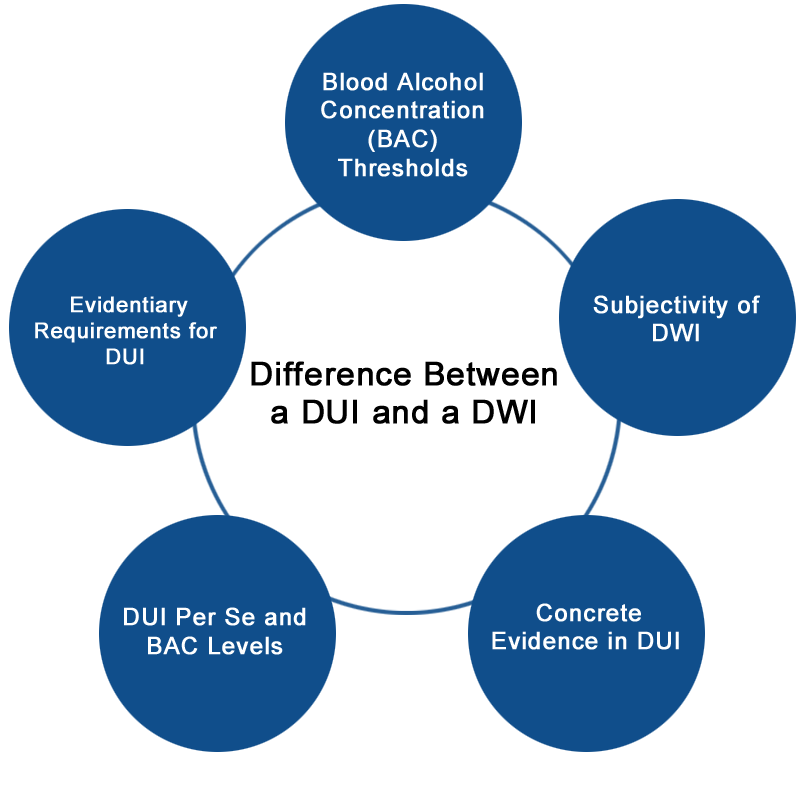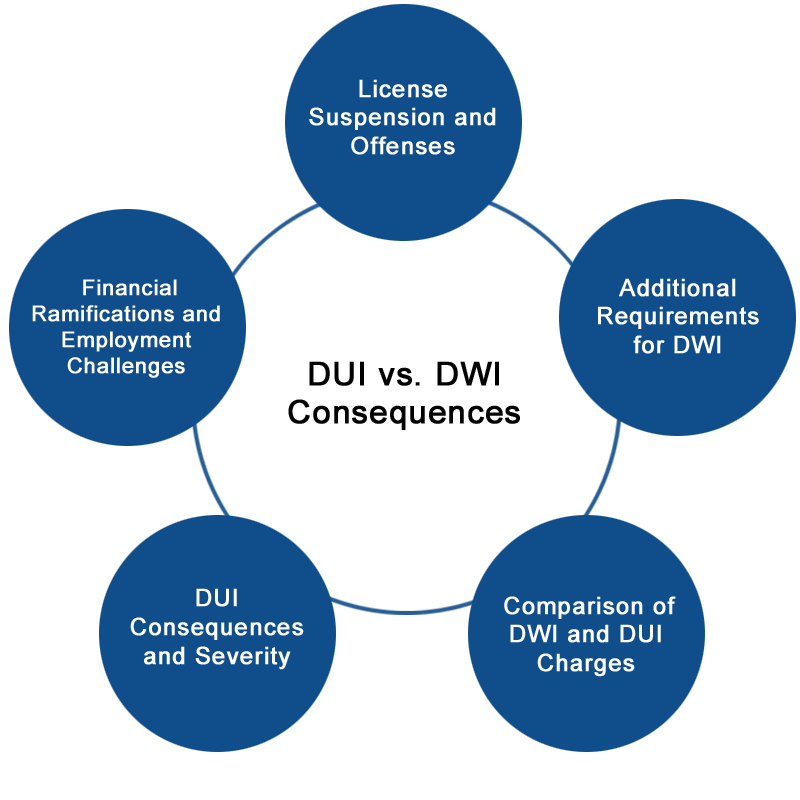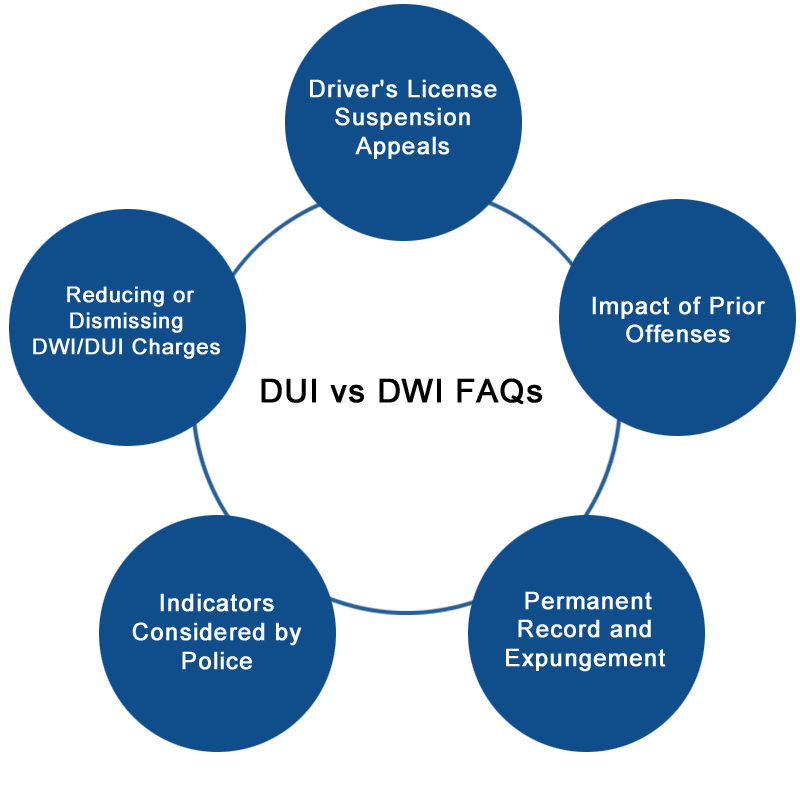Question: Can you explain the difference between a DUI and a DWI charge in Oklahoma?
 Answer: In the state of Oklahoma, there are two classifications for those who have been found driving while intoxicated by alcohol or other substances. The first, Driving While Impaired (DWI), applies to those whose blood alcohol concentration (BAC) is between .05% and .08%. A BAC of .08% or higher is considered Driving Under the Influence (DUI) and carries higher penalties as a more serious charge.
Answer: In the state of Oklahoma, there are two classifications for those who have been found driving while intoxicated by alcohol or other substances. The first, Driving While Impaired (DWI), applies to those whose blood alcohol concentration (BAC) is between .05% and .08%. A BAC of .08% or higher is considered Driving Under the Influence (DUI) and carries higher penalties as a more serious charge.
The difference between the two isn’t just about the numbers, however. With a DWI charge, the issue is whether the officer felt that the driver was not safely able to operate the vehicle, whether through alcohol, drugs or prescribed medications. The car doesn’t even need to be moving for the driver to be charged with DWI if the potential exists for unsafe operation. Because DWI is subjective, based on the officer’s judgement and the results of sobriety tests, it can be more difficult to prove in court.
As a charge, DUI is easier to prove in court, as it relies on the concrete evidence of the BAC test results. A reading of .08% or higher will result in a DUI, but even if the driver refuses the test they can still be charged based on the officer’s observations or results of a sobriety field test. While these factors play into both a DUI and DWI charge, a DUI charge relies far more on the results of the BAC test.
Because of this, DUI law in Oklahoma carries provisions for DUI per se, which essentially acts like the classic “Pottery Barn Rule” – you break it, you bought it. Regardless of any other factors, if the driver’s BAC is found to be above .08%, then the prosecution has all the evidence they need to charge them. With a BAC between .06% and .07%, the prosecution needs to provide further evidence such as testimony from the arresting officer to prove their case.
This distinction allows the state of Oklahoma to take on the problem of impaired driving with greater nuance, with graduated penalties and greater legal ramifications for different levels of impairment.
 DUI vs. DWI: The Consequences
DUI vs. DWI: The Consequences
As separate charges designed to create a “sliding scale” of consequences for greater impairment while driving, DWI and DUI carry their own distinct penalties.
DWI is charged as a misdemeanor, which does not carry penalty points on a driver’s license, but does carry its own set of consequences. These include a potential jail term of six months, a maximum $500 fine and mandatory testing for drugs or alcohol. Those charged could have their license suspended for 30 days on a first offense, six months on a second offense, or a year for further offenses.
Additionally, depending on the circumstances of the case, a driver charged with DWI could be forced to participate in impaired driver programs, DUI school, or a victim impact panel. They may also be required to install an ignition interlock device (IID) in their vehicle, perform community service or engage in drug counseling. This is all on top of the hike in insurance premiums and difficulties a DWI charge can cause in seeking employment.
That said, DWI is still considered a lesser charge than DUI. As a misdemeanor, DWI charges don’t escalate to felony charges, do no add points to the driver’s license, and require greater evidence than DUI charges.
A DUI is usually charged as a misdemeanor, but can potentially be charged as a felony based on the number of prior offenses or the level of the BAC test results. As a more severe charge, it carries a potential jail term of up to a year for a first offense, fines up to $1,000, and mandatory installation of an IID. A first offense carries an automatic 180-day suspension of the driver’s license, with potential for up to six months.
A DUI charge carries even greater potential that the driver will be required to attend counseling and/or programs for impaired drivers. It will also likely create a higher financial hit from fines and insurance rates, plus greater difficulties seeking employment due to the more serious charge on the driver’s criminal record.
There are numerous factors that will play into these consequences, ranging from the recorded BAC level at the time of the arrest to the driver’s prior convictions, as well as any circumstances of the incident such as an accident.
 DUI vs DWI FAQs
DUI vs DWI FAQs
What you’ve read gives you the basics of the distinction between DUI and DWI, both the legal distinction between them and the consequences each one carries. But there is more you should know about these two charges.
Can I appeal my driver’s license suspension?
Yes, if you request a hearing from the Oklahoma Department of Public Safety. This request must be made within 30 days of the arrest or the suspension will remain in effect – 30 days for a DWI or upwards of six months for DUI. During the appeal hearing, there are four key points that Service Oklahoma will need to prove:
- The arresting officer had reason to believe you were driving or in control of the car
- The officer placed you under arrest
- The officer explained the consequences of refusing a test of your BAC if you opted out
- That you either refused the test or tested within the range that would trigger DWI or DUI charges.
How will my prior offenses affect new DWI or DUI charges?
While each case is different, as a general rule prosecutors do not take prior DWI or DUI convictions into account when proposing plea deals. Prior convictions can have an effect on the plea bargain your attorney may offer them, however.
Does a DUI or DWI stay on my permanent criminal record?
Yes, both DUI and DWI convictions remain on your criminal record forever. While it is possible to possibly have these records expunged, they will otherwise remain a part of your record, causing long-term potential impacts to your ability to secure employment or housing.
What other signs are police looking for to determine DWI or DUI?
To determine whether a driver is under the influence, they may look for signs such as speech impairment, slowed reaction times, and difficulties with coordination that make routine tasks difficult. Observations of more severe impairment, such as slurred speech, erratic driving, difficulty following directions or problems completing field sobriety tests will often be signs that the driver has a high enough BAC for a DUI.
Is it possible to have my DWI or DUI charges reduced or dismissed?
Yes, with the proper preparation. At the Edge Law Firm, we never approach a case with the mindset that it is unwinnable. Our attorneys understand the long-term hardship you will experience with a DWI or DUI on your criminal record and offer nothing less than our utmost commitment to help you avoid a permanent mark on your record.
That commitment begins with a complimentary, no-obligation assessment of your case. Once you understand our ability to dig deeper into a case and how it can defend your freedom, you’ll begin to benefit from our relentless approach to justice. We track down witnesses, we gather evidence, we carefully analyze police reports and the prosecution’s evidence to find any errors. And we bring all of this to the negotiating table, where we show the prosecution why they should reduce or dismiss your charges before the trial begins.
And if the prosecution disagrees, then we prove it in court, using our depth of experience defending cases just like yours and the overwhelming evidence we’ve gathered. It’s something we’ve done time and time again for clients just like you. At The Edge Law Firm, your freedom is all that matters, and we won’t stop until we’ve secured the best outcome for you.
Please submit your contact information below to schedule a free, no-obligation legal consultation with The Edge Law Firm.
Please submit our secure contact form below:
